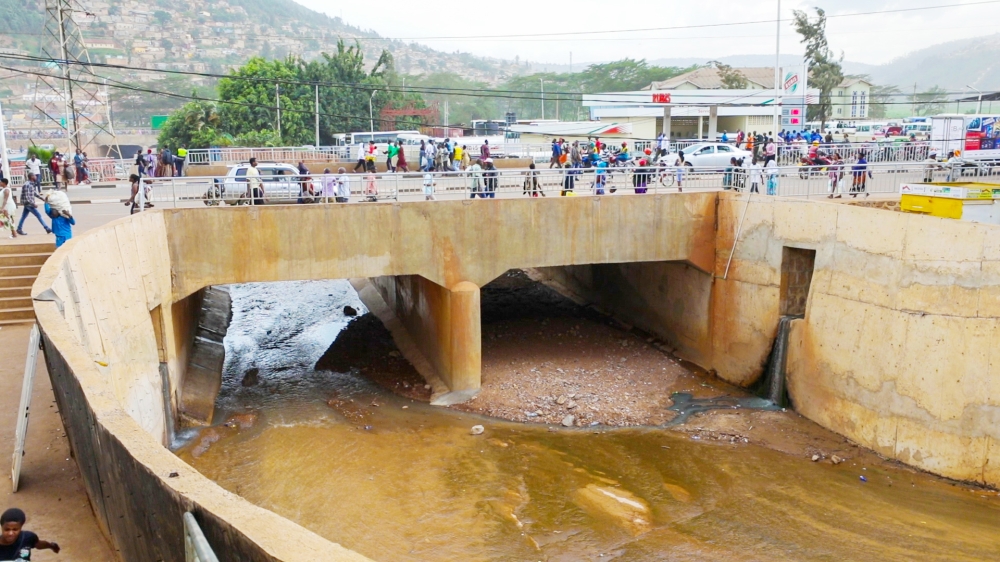

Over the past years, Nyabugogo suburb has evolved into a pivotal hub for road transportation, connecting various regions of the country due to the taxi park and its location.
Beyond facilitating the movement of buses and trucks transporting goods, Nyabugogo serves as a conduit for water from different sectors of the Nyarugenge district, notably Muhima, Kigali, Nyakabanda, and Gisozi sectors as well as Kicukiro district.
ALSO READ: Residents anticipate progress as Ngoma-Nyanza road construction advances
Despite numerous projects aimed at rejuvenating the area with new buildings, the center faced recurrent threats from floods, especially during the rainy seasons. Heavy rains rendered the area impassable, posing risks to human lives and businesses.
To address these challenges, substantial investments have been made, notably during the 2022/2023 fiscal year. The national budget, significantly supplemented by taxes, played a pivotal role in implementing vital projects.
City of Kigali officials attribute the progress to completion of 47 kilometers of roads in the last fiscal year, with an additional 30 kilometers currently under construction. These developments not only enhance urban transport but also contribute to overall settlement improvements.
Several noteworthy projects have been completed, including the construction of two bridges over Mpazi drainage at Nyabugogo, costing over Rwf 1,7 billion. Drainage projects, such as Kabusunzu - APACE and Rwimbogo - Ruragendwa in Kicukiro district, were completed at Rwf 1, 09 billion and Rwf 788.6 million, respectively.
ALSO READ: Mwulire Sector welcomes new health centre
Additionally, a 1.2 kilometre asphalt road between Kagarama and Muyange was built at a cost of Rwf 1.0 billion, accompanied by decent public lighting on various roads. The illuminated roads include a 7-kilometer Ruliba-Karama-Nyamirambo road at the cost of Rwf 299.1 million, a 3-kilometer long road of Ndera at Rwf 128.2 billion, and a 6-kilometer road linking Kanombe military barrack to Rubilizi and Busanza at the cost of Rwf 256.4 million.
Samuel Dusengiyumva, Mayor of the City of Kigali, says all these achievements have been made possible thanks to compliant taxpayers.
"You remember the flooding that used to affect Nyabugogo; these new bridges have solved those issues. With these new drainages, we have alleviated fears and risks to the lives of citizens, as the floods used to claim human lives because of natural disasters," he said.
Residents, such as Jean Claude Nkundineza from Kicukiro district, and Felix Munyaneza from Kimisagara in Nyarugenge district, emphasize the importance of taxes in witnessing key infrastructure developments. They acknowledge the government&039;s role in tapping into resources to build critical infrastructure.
"We usually know the contributions of taxes; we know that these roads are constructed thanks to the taxes, hospitals, and it is a testament to the development we can achieve if we all raise the level of tax compliance," said Munyaneza.
Jeanne Françoise Mubiligi, the acting President of the Private Sector Federation in Rwanda, expresses confidence in tax payments, believing they will be efficiently managed and directed towards crucial development activities.
"This confidence is affirmed when we observe infrastructure improvements such as roads, electricity, and water supply, all of which are vital for our industries," she added.
Beyond expanding existing roads, the city of Kigali plans to build roads in newly inhabited parts lacking infrastructure, encompassing both paved and unpaved roads. This forward-looking approach aligns with international standards for urban development and accessibility.


